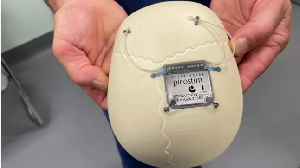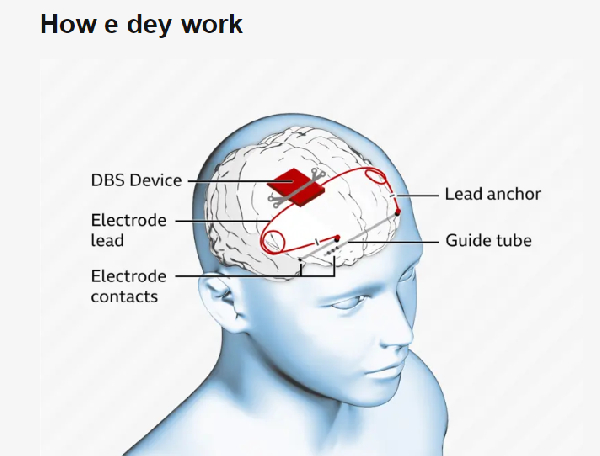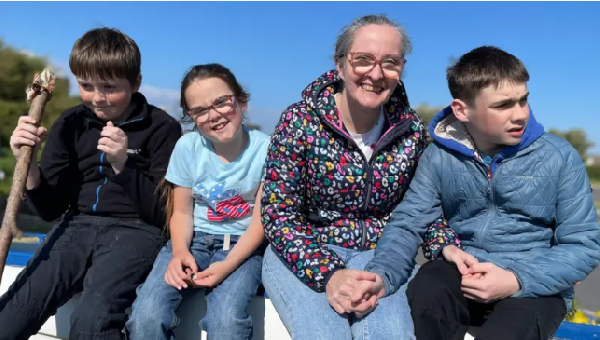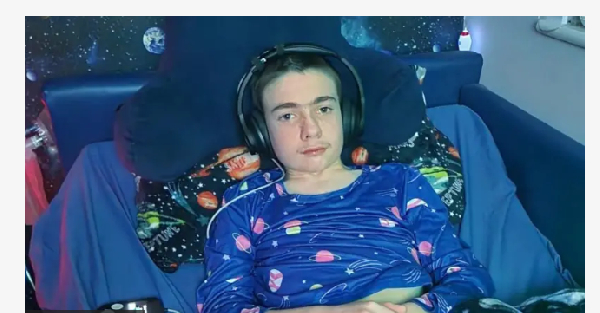 Dem screw di device is screwed into di bone
Dem screw di device is screwed into di bone
One boy wey get serious epilepsy don becom di first patient for di world wey go try one new device wey dem put for im head to control di seizures wey im dey get.
Di neurostimulator dey send electrical signals deep into Oran Knowlson brain, and e don reduce im daytime seizures by 80%.
Im mama Justine, tell di BBC say di boy dey happier and e don get a “much better quality of life”.
Di surgery bin happun for October as part of a trial for di Great Ormond Street Hospital for London wen Oran bin dey 12 years old. E dey 13 years now.
Oran, from Somerset, get one condition wey im name na Lennox-Gastaut syndrome, a type of epilepsy wey dey resistant to treatment, wey im bin develop since e dey three years old.
Since den e don dey suffer several daily seizures ranging from two dozen to hundreds.
Wen we first tok to Oran mama last autumn, prior to di surgery, she bin explain how Oran epilepsy don dominate im life: "E don rob am of all im childhood."
She tell us say Oran dey get different type of seizures, including those wey go nack am for ground, e go dey shake violently, bifor im go lose consciousness.
She tok say sometimes e go stop breathing and e go require emergency medication to wake am up.
Oran also get autism and ADHD, but Justine tok say im epilepsy na im biggest challenge: "I bin get a fairly bright three-year-old, and within a few months wen di seizures start, e don bad wwell well and lose a lot of skills."
Oran follow for di CADET project - a series of trials we dey assess di safety and effectiveness of deep brain stimulation for severe epilepsy.
Di partnership involve Great Ormond Street Hospital, University College London, King’s College Hospital and di University of Oxford.
Di 'Picostim neurotransmitter' na device wey one UK company - Amber Therapeutics - dey make.
How e dey work
Epilepsy seizures dey dey triggered by abnormal bursts of electrical activity for inside di brain.
Di device, wey dey bring out constant pulse of current, aim to block or disrupt di abnormal signals.
Bifor di operation, Justine tell us: "I want make e find some of imself again through di haze of seizures. I go like to get my boy back."
Di surgery, wey last for around eight hours, bin take place in October 2023.
Di team, led by consultant paediatric neurosurgeon Martin Tisdall, bin insert two electrodes deep inside Oran brain until e reach di thalamus, a key relay station for neuronal information.
Di margin of error for di lead placement dey less dan a millimetre.
Dem connect di ends of di leads to di neurostimulator, a 3.5cm square and 0.6cm thick device wey dem place in a gap for Oran’s skull wia dem bin remove di bone.
Dem come screw neurostimulator into di surrounding skull, to anchor am make e no comot.
Dem don dey try deep brain stimulation for children wey get epilepsy bifor, but until now neurostimulators na for chest dem bin dey put am, den connect am wit wires up to di brain.
Martin Tisdall tell di BBC: "Dis study, hopefully go allow us to identify weda deep brain stimulation na effective treatment for dis severe type of epilepsy and e dey also look at a new type of device wey go dey particularly useful for children bicos di implant dey inside di skull, no be for di chest.
"We dey hope say dis go reduce di potential complications."
Dat go also include reducing di risk of infections after di surgery, and di device failing.
Dem give Oran one month to recover from di operation bifor dem switch on di neurostimulator.
Wen e dey on, Oran no go dey feel am. And e fit recharge di device every day wit im wireless headphones as e dey do oda tins wey im dey normally enjoy, like watching TV.
We visit Oran and im family seven months afta di operation to see how dem dey get on. Justine tell us say massive improvement don dey about Oran epilepsy: "E dey more alert and e no dey get drop seizures during di day."
Im night-time seizures also dey "shorter and less severe".
"I don dey get my boy back small small," she tok.
Martin Tisdall say: "We dey very happy say Oran and im family don see such a huge benefit from di treatment and say e don dramatically improve im seizures and quality of life."
Oran dey take riding lessons now, wey im dey enjoy well well.
Although one nurse dey always dey close wit oxygen, and one of im teachers dey always stay near just in case, two of dem neva dey needed so far.
As part of di trial, dem go fix three more children wey get Lennox-Gastaut syndrome wit di deep brain neurostimulator.
Currently, Oran dey get constant electrical stimulus from im device.
But in future, di team dey plan to make di neurostimulator respond in real time to changes for im brain activity, in an attempt to block seizures as dem wan happen.
Justine tok say she dey excited about dis next phase of di trial: "The Great Ormond Street team don give us hope back…now di future dey brighter."
Oran family know say di treatment no be cure, but dem dey optimistic say im go kontinu to emerge from di shadow wey im epilepsy cast on am.
Dem bin don use di Picostim neurostimulator, wey Amber Therapeutics dey make, to treat patients wey get Parkinson’s disease.


Oran (R) dey live wit im mama, brother and sister

Oran's wireless headphones fit recharge di device